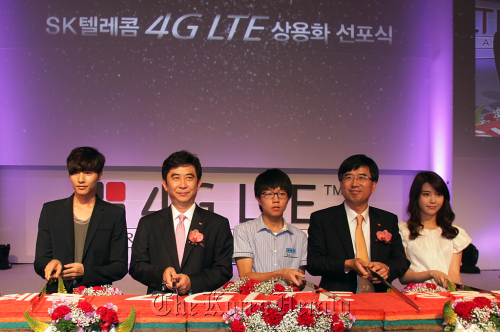Carrier sees advantage in 4th-generation tech
The country’s largest mobile telecom services provider SK Telecom has been putting CDMA and WCDMA technologies to commercial use ahead of its peers both in and outside the Korean market.
Since 2005, the company has invested funds equivalent to more than 14 percent of its annual sales into updating and upgrading its networks, and this year SK Telecom plans to inject trillion won 2.3 trillion won ($2.1 billion), about 17.3 percent of its annual sales target of 13.25 trillion won, into related projects.
While such efforts have allowed SK Telecom to become and maintain its status as the country’s top mobile carrier, the company is once again leading changes in the telecom market.
The country’s largest mobile telecom services provider SK Telecom has been putting CDMA and WCDMA technologies to commercial use ahead of its peers both in and outside the Korean market.
Since 2005, the company has invested funds equivalent to more than 14 percent of its annual sales into updating and upgrading its networks, and this year SK Telecom plans to inject trillion won 2.3 trillion won ($2.1 billion), about 17.3 percent of its annual sales target of 13.25 trillion won, into related projects.
While such efforts have allowed SK Telecom to become and maintain its status as the country’s top mobile carrier, the company is once again leading changes in the telecom market.


On June 30 the company held an event marking the beginning of the process of commercializing the fourth generation telecom network known as Long Term Evolution or LTE.
SK Telecom quickly put its plans into action. In July the company began commercial services on its LTE network in Seoul ahead of its two rivals, and plans to begin upgrading the network to LTE-Advanced standards from 2013.
Although SK Telecom again took the lead in introducing new technologies, the company has plans aimed at taking its services to a standard beyond those offered by the competition.
Under the plans SK Telecom will apply its Smart Cloud Access Network technology in establishing the LTE network, which will allow the company to tightly monitor and control base stations for increased efficiency.
In addition, SK Telecom plans to apply advanced technologies before its competitors to ensure that high quality services are provided.
While SK Telecom is direct significant resources to its main business -- mobile telecom services -- to maintain its lead in the market, the company is also seeking ways to ensure growth and stability in the future.
One such project is the proposed acquisition of the world’s second-largest producer of memory chips, Hynix Semiconductor.
The company is bidding against the shipbuilder STX Group, and is currently carrying out due diligence on Hynix.
“SK Telecom plans to secure the basis for growth in the future, and seek diversification in the field of information communication technology by acquiring Hynix Semiconductor,” SK Telecom said.
“In addition, it will allow the company to become a global company using the semiconductor business, which is expected to continue expanding fueled by the growth of the market for devices such as smartphones, tablet computers and smart televisions.”
However, SK Telecom is not relying entirely on the still undecided acquisition of Hynix Semiconductor to take it to the global stage.
In June 2010, the company entered the Malaysian telecommunications market when it acquired stakes in Malaysia’s WiMAX services provider Packet One.
The $100 million deal gave SK Telecom 25.8 percent of the Malaysian company making SK Telecom its second-largest shareholder.
One Packet is Malaysia’s largest WiMAX services provider and holds about 7 percent of the country’s market for broadband internet services.
In addition to acquiring stakes in existing businesses in other countries, SK Telecom has also been pushing to take local developed services abroad.
One such project rapidly taking shape involves the company’s mobile applications store T-Store.
The store was launched less than two years ago in September 2009, but more than 120,000 applications are already available on the market, and the number of downloads have broken the 200 million mark. Using the experiences in operating the T-Store in Korea, the company is planning to begin services in other countries including China and Japan.
Along with the applications store, the company has been working on the Mobile in Vehicle technology, which allows mobile phones to be linked up to the infotainment systems fitted in automobiles.
By Choi He-suk (cheesuk@heraldcorp.com)








![[Graphic News] More Koreans say they plan long-distance trips this year](http://res.heraldm.com/phpwas/restmb_idxmake.php?idx=644&simg=/content/image/2024/04/17/20240417050828_0.gif&u=)
![[KH Explains] Hyundai's full hybrid edge to pay off amid slow transition to pure EVs](http://res.heraldm.com/phpwas/restmb_idxmake.php?idx=644&simg=/content/image/2024/04/18/20240418050645_0.jpg&u=20240419100350)





![[From the Scene] Monks, Buddhists hail return of remains of Buddhas](http://res.heraldm.com/phpwas/restmb_idxmake.php?idx=652&simg=/content/image/2024/04/19/20240419050617_0.jpg&u=20240419175937)

![[KH Explains] Hyundai's full hybrid edge to pay off amid slow transition to pure EVs](http://res.heraldm.com/phpwas/restmb_idxmake.php?idx=652&simg=/content/image/2024/04/18/20240418050645_0.jpg&u=20240419100350)

![[Today’s K-pop] Illit drops debut single remix](http://res.heraldm.com/phpwas/restmb_idxmake.php?idx=642&simg=/content/image/2024/04/19/20240419050612_0.jpg&u=)